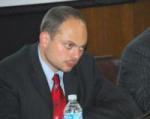
On Monday, Moscow Mayor Sergei Sobyanin — Vladimir Putin’s former chief of staff often touted as a possible successor in the Kremlin — officially launched his reelection campaign ahead of the vote on Sept. 9. His campaign manager has announced a citywide drive with 10,000 volunteers who, starting this week, will be going from door to door, manning election stands, canvassing on the streets and handing out leaflets, newspapers, stickers, magnets and other campaign memorabilia. The mayor has decided to forgo the airtime slated for debates between candidates on municipal television networks and radio stations. As his campaign chief explained, Sobyanin will “donate these minutes” to opposition candidates.
The trouble is that there are no opposition candidates. This year’s election in Moscow is a pale shadow of the mayoral contest five years ago that drew nationwide and international attention far beyond what would usually be afforded to a local vote. In 2013, the Kremlin decided to break from the norm and allow a genuine challenger into the race. Alexei Navalny, a prominent anti-corruption campaigner and one of the leaders of the 2011-2012 street protests, was registered as a candidate for mayor, presumably to demonstrate the lack of support for the pro-democracy opposition continuously asserted by Russia’s state-run media. Authoritarian regimes sometimes start to believe their own propaganda.
Advertisement / Reklaam
Advertisement / Reklaam
The reality check must have been unpleasant. According to official results, Navalny received27 percent of the vote, proving what good-faith observers of Russian politics have long known: that when allowed on the ballot, the genuine opposition gains significant support. (The same day Moscow held its mayoral vote, about 160 miles away, opposition leader Boris Nemtsov actually won his election in the historic city of Yaroslavl, becoming a member of the regional parliament.) Back in Moscow, Sobyanin scraped past the 50 percent threshold, barely avoiding a humiliating runoff. A 25,000-strong rally by Navalny’s supporters in downtown Moscow the day after the election had the air of a victory party.Evidently, the Kremlin did not enjoy the experiment. Last month, the Moscow Electoral Commission barred Dmitri Gudkov, a former member of the Russian Parliament, from challenging Sobyanin in the mayoral election; the decision was upheld by Russia’s Supreme Court.
Gudkov was one of a handful of opposition lawmakers in the last Duma. He led Russia’s first-ever parliamentary filibuster against a law restricting the freedom of assembly. He opposed the ban on adoptions of Russian orphans by U.S. citizens (dubbed “Herod’s Law”) introduced in revenge for the Magnitsky Act. He refused to vote to ratify the annexation of Crimea. He challenged the decision to strip prominent dissident Vladimir Bukovsky of his Russian citizenship. And he (unsuccessfully) tried to call for a moment of silence in the chamber after the 2015 assassination of Nemtsov.
In the 2016 parliamentary election, Gudkov came closest of any opposition candidate to winning a seat in the Duma, receiving 20 percent of the vote in Moscow’s Tushinsky district, just six points behind the Kremlin’s candidate. In 2017, he scored a stunning upset in Moscow’s local elections, leading the United Democrats coalition to a strong second-place finish, with 267 elected municipal lawmakers (out of 1,502 contested seats) across the city. To put things in context, the nationalist LDPR party, led by Vladimir Zhirinovsky and tacitly backed by the Kremlin, won a total of four seats.
Advertisement / Reklaam
Advertisement / Reklaam
This time, the LDPR’s candidate for Moscow mayor, Mikhail Degtyarev, had no trouble registering for the ballot. Gudkov was told that he did not pass the so-called municipal filter, a requirement added to Russian electoral law in 2012 that involves gathering signatures from a certain number of local lawmakers. At the time the Constitutional Court upheld the measure, justifying it by the need to “exclude individuals who have insufficient support among voters from the electoral process.” In recent years, the “filter” has been usedby the authorities to bar strong challengers — such as Yekaterinburg Mayor Yevgeny Roizman and Pskov regional lawmaker Lev Shlosberg — from gubernatorial elections across Russia. Those with “insufficient support among voters” — like the four shadow-boxers running alongside Sobyanin in this year’s Moscow mayoral election — never seem to have trouble getting on the ballot.“Moscow has been turned into a sultanate,” Gudkov said, denouncing the election as “illegitimate” and calling on his supporters to spoil their ballots on Sept. 9 by writing in his name. For now, this will have no practical effect. Sobyanin will be triumphantly reelected with an official percentage much exceeding his showing five years ago.
It will be a Pyrrhic victory. No official tallies will be able to hide the fact that hundreds of thousands of Muscovites — just like millions of Russians in the March presidential election — were, in effect, disenfranchised by the lack of a genuine alternative on the ballot. Such a situation can continue for some time, but not forever. The logic of history is ruthless: Where there are no elections, there will, one day, be barricades.
























